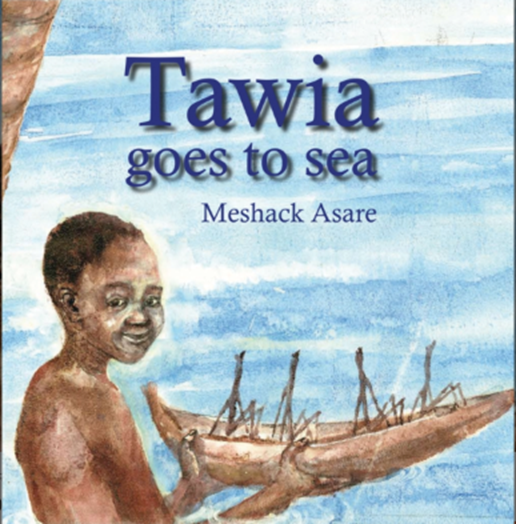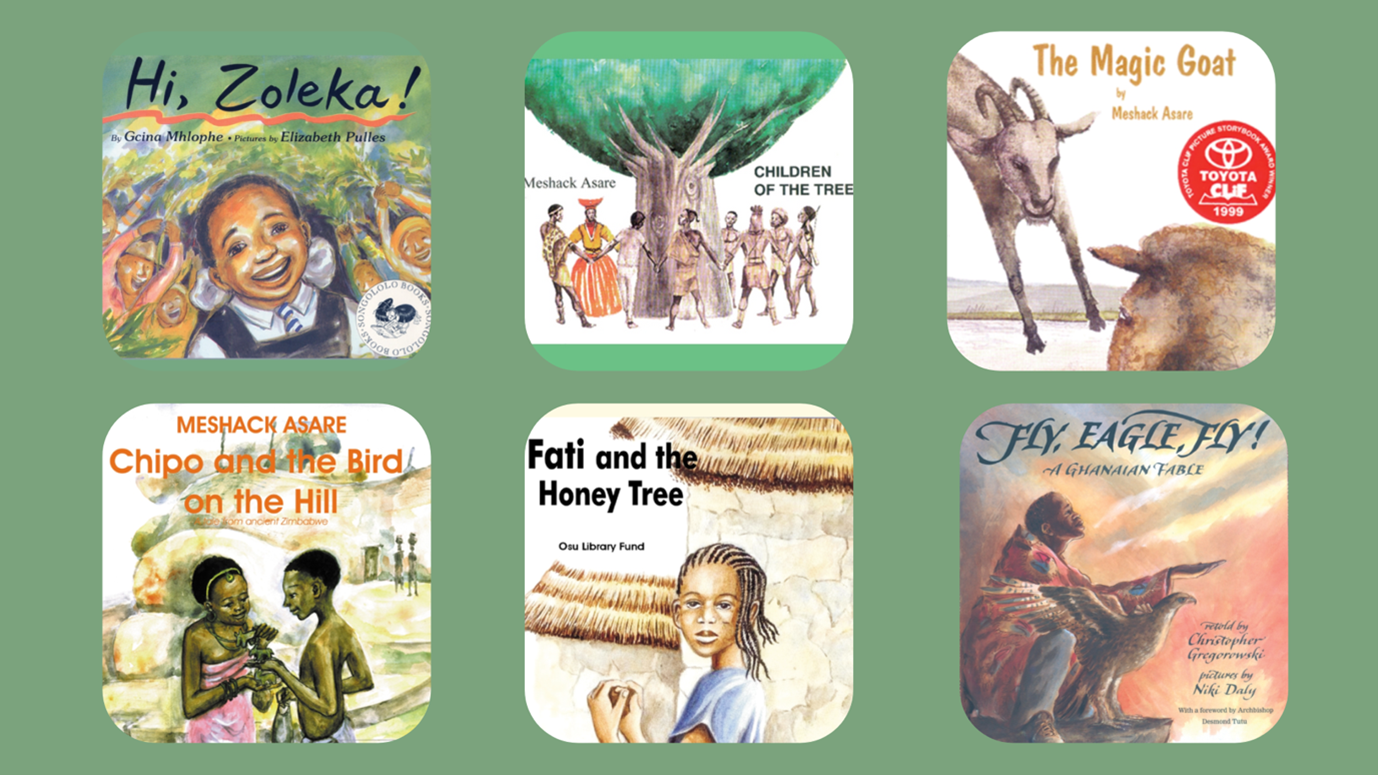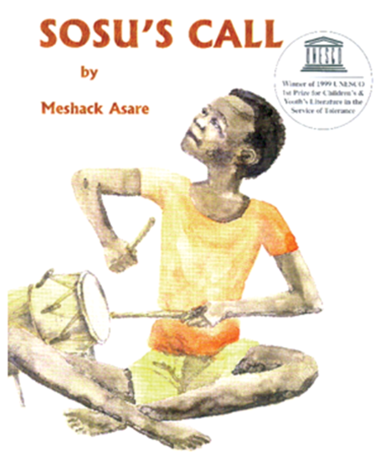In conversation with Akoss Ofori-Mensah

The founder and managing director of Sub-Saharan Publishers, Akoss Ofori-Mensah is a force to be reckoned with in the publishing industry. As part of our ‘in conversation with’ series, we chat to Akoss from her home in Accra, Ghana, about the current state of publishing in Africa, the importance of sharing African stories with the rest of the world, the impact of COVID-19 on the industry, and, in her opinion, how much African creatives have lost with the diminution of the Zimbabwe International Book Fair. (ZIBF)
As noted on her LinkedIn profile, Akoss has ‘proved African published books can and do travel!’ She has done this over many years in the industry as a publisher, and while serving the Ghana Book Publishers Association in various roles, including president. She has also been a member of the African Publishers Network (APNET), the International Board on Books for Young People (IBBY) Executive Committee, and sits on the African Books Collective's Council of Management, as well as on the Africa Publishing Innovation Fund (APIF) Committee.
Leanne Rencken (LR) for the Early Literacy Resource Network: Cognizant of the devastating effects of the COVID-19 pandemic on early literacy and learning in general, can you provide some insight into the current state of the book and publishing industry on the continent and in the market that Sub-Saharan Publishers (SSP) serves?
Akoss Ofori-Mensah (AOM): Organizations like Worldreader were involved with the provision of readers on tablets for children in Ghana long before the pandemic hit, and SSP has 15 titles with them. The Ghana Book Development Council, often in concert with the Ghana Library Authority supplies readers to schools and since the COVID-19 related lockdowns, has run reading programmes. Although other organizations were doing similar work, children in public schools were still affected because they do not have phones or tablets from which they can read.
Despite the technology, I think physical books will hold sway for a long time to come; and in places like Africa, where the power supply is unreliable, children are better off with physical books.
In the book business, physical meetings help a lot; the way a book is presented to a customer determines their interest in the book. Thus, book fairs are extremely important in exposing the book to the greater world. The Frankfurt and London Book Fairs and the Bologna Children’s Book Fair are crucial to the book trade, but they were all cancelled during the COVID-19 lockdowns and so international marketing was stalled, and business has been poor.

On the African continent, we are still not on our feet since the collapse of ZIBF in the mid 2000s. ZIBF was a vibrant fair that drew participants from all over the world. I sold many of the rights for the Meshack Asare novel, Sosu’s Call there. The Cape Town International Book Fair took over from ZIBF, and in 2006 I sold ten titles to Rainbird Publishers. Unfortunately, it subsequently also had a nosedive.
Without a bustling African book fair, Frankfurt and Bologna provided crucial alternatives. It was at these two fairs that the rights for Sosu’s Call were sold to the USA, Germany, Portugal, Spain, Italy, Brazil, the UK, Denmark, Mongolia, and Taiwan. At the same time, courtesy of the French Ministry of Foreign Affairs and the late Viviana Quiñones’ work with La Joie par les Livres (joy through books), Francophone West Africa got a French edition of Sosu’s Call.
LR: How do we get books into children’s hands? Especially mother-tongue resources. Do you think publishers / government agencies can do more to partner with libraries?
AOM: In Africa, we have a challenge in that we do not speak the same language in many communities. The East Africans are lucky because they adopted Kiswahili as a regional/official language. In other parts of Africa, things are very different. For example, in Ghana, we have many languages like Ewe, Nzima, Ga, Dagbani, Kassem, and Akan, and there are at least four varieties of Akan, each with its own orthography. In Nigeria, they have Yoruba, Ibo, Hausa and many other smaller language groups. South Africa is perhaps the only African country that has seriously developed some of its languages such as Ndebele, Zulu, Xhosa, Swati and Sesotho. In this regard I salute the Project for the Study of Alternative Education in South Africa (PRAESA) for the work they have done in providing readers in the various South African languages, especially for children!
The European missionaries who brought Western education to the Gold Coast studied the languages of the people among whom they settled and developed the orthography and books in languages like Ga, Asante Twi, Akwapim Twi and Fanti Twi. However, it appears at some point in the development of Ghana, literacy in English was emphasized to the disadvantage of local languages. Thus, most publishers do not publish books in mother tongue.
Development partners at times buy readers in local languages for disadvantaged communities. An example is the Fati series which we published in Dagaare for UNICEF/USAID for children in northern Ghana. We have also done a book on environmental cleanliness in Dagbani for the Environmental Protection Agency in Ghana. And two of our picture books by Meshack Asare, Kwajo and the Brassman’s Secret, and Meliga’s Day have been translated and published in Ewe and Kassem respectively. However, the crux of the matter is that the colonial languages still hold sway as the powers that be send their children to private schools to learn English and French; and all official transactions are done in English. Thus, not much attention is paid to the teaching and development of readers in local languages. Teachers should be trained to learn at least one local language in addition to their own, so that they are able to teach it.
LR: Does technology and connectivity offer any hope to the publishing industry? Would accessibility to online readers and a better internet infrastructure make a lasting difference? Would publishers benefit from training in the creation of ebooks?
AOM: Internet connectivity is often unreliable. Often there are power cuts and students cannot charge their phones; neither can they read physical books at night. And, unlike the Western world, it’s not that easy for every child to have access to a computer or a tablet. It’s quite expensive for the Ministry of Education to get these things for all the children in the country. Available electricity is also vital for actual publishing work as it is needed for designing and typesetting. However, I appreciate the fact that through the internet I have managed to keep in touch with friends and customers to some extent. Because we have a website and we’ve been going to book fairs over the years, a lot of our books have travelled to other countries. Just this week I sold rights for one of the books, Gizo-Gizo! A tale from the Zongo Lagoon, to a Japanese publishing company who discovered the children’s story via our website and will be translating it into Japanese.
LR: For African publishers, textbook production is their bread and butter; can we do more to produce books related to the idea of reading for pleasure, and educating children on the joy inherent in leisure reading?
AOM: Mostly, it is the proceeds from textbooks that are used to develop readers and that is one of the reasons why a lot of publishers produce textbooks. Once a textbook is selected by the Ministry, the publisher can be sure of a bulk purchase which will fetch some funds which can be used to produce other books, like readers. I have done this a few times in my publishing house. I have published a lot of children’s books, which only became available because I had previously done a textbook for the Ministry.
However, in Ghana the production of textbooks is fraught with challenges, and the creation of textbooks for primary schools has been in limbo since 2019. It is only now in 2022 that contracts have been issued; it takes forever for the Ministry to assess and select the books deemed appropriate for schools. With all their resources absorbed by textbooks, publishers find it difficult to do readers. Right now, I’m completely broke! We’ve done the textbooks for the Ministry, but it looks as if it’s going to take a long time before we get paid.
LR: As a publisher, you have a good idea of what it takes to create books for children. Are we doing enough to develop the skills needed to produce children’s books: writing, illustrating, translating, editing, designing? Are we doing enough to inspire young people to pursue these skills as career options?
AOM: A great number of publishers come into the profession without ever having been to a publishing school, myself included. However, more on-the-job training could be provided. That is one of the things I miss about the ZIBF; they used to run workshops for editors, illustrators, booksellers, and designers. I also remember that when donors set up APNET they gave every national publishers association a computer and many training workshops were held to train African publishers in these skills. The Kwame Nkrumah University of Science and Technology (KNUST) has a Publishing Studies department in Kumasi, Ghana, and there’s something similar in South Africa. I think at least one university in each African country should have a training centre where young aspiring publishers can learn the trade. Alternatively, for those who can afford it, Oxford Brooks University in the UK offers courses in publishing.
LR: The World Bank initiative, Read@Home, is focusing on print rather than digital access because they understand that internet, technology, and devices are not readily available in many homes, particularly in rural areas. Do you agree with that strategy?
AOM: Yes, I support the Read@home programme and I believe the printed book will be with us for many years to come. Aside from internet connectivity, which is not reliable, having the book in hand gives the reader a positive feeling. One can read as and when he or she feels like it, and they are not conditioned by the availability of the internet.
LR: NBA is collaborating on creating learning materials for designers on using InDesign and other DTP software to create storybooks for printing. What has been your experience in Ghana and elsewhere in Africa on the skills level of professional designers?
AOM: I have worked with one designer for many years, Kwabena Agyepong; he was trained at KNUST, and he is excellent. Some of the covers he has designed include the Meshack Asare books Tawia goes to Sea, The Magic Goat, Noma’s Sand and The Canoe’s Story among others.

There are people in the industry with an interest in art who learn design and illustration on the job, but if they could afford it, cost and timewise, it would be better for them do a complete course at a university so they can handle the job better. A short course would also work.
LR: What do you make of the grant winners for the IPA’s Africa Publishing Innovation Fund Awards - 2022?
AOM: The indefatigable IPA President, Bodour Al Quasimi, deserves a gold medal and great commendation for what she has done to revive publishing and reading in Africa. Abandoned libraries have been refurbished and stocked with new books; reading programmes are being supported; and innovative ways of providing reading materials, such as audiobooks, for both children and adults, have been put into place. The president had a fund set up and people could present their projects and apply, and if they qualified the IPA gave them support. She did not discriminate; projects from all over Africa were supported. I haven’t seen something like that in my entire publishing career. She has done tremendous work! May God richly bless her.
An example of her work is the support the fund gave for the establishment of a learning resource centre in Paga, in the upper east region of Ghana. This is one of the impoverished regions; and the girls there run down south to become head porters in the markets of Kumasi and Accra. Their reason for running is to escape from being forcibly married to men old enough to be their fathers or grandfathers. A young woman, Alira Bushiratu, has set up a learning resource centre, called Learners Girls Foundation with an APIF grant, as an alternative for girls from that region to seek education and computer skills. She also allows boys to benefit from the resource centre. In my humble opinion, this project is the best thing that has happened to that region of Ghana.
LR: Are African publishers doing enough to create more accessible books in formats that are targeted towards print-disabled (blind / visually impaired) young readers?
AOM: African publishers are creating works for young children, but they have not paid much attention to physically challenged children. I think that area needs to be addressed.

LR: In conclusion, let’s talk about the importance of African publishing to Africa – it’s cultures, literature, and history, beyond the role of publishing textbooks for government.
AOM: As a child, I read European children’s stories, and as I grew up, I got into the publishing business, and I felt that, as Africans, we have stories we can share with the rest of the world. For example, I’ve done two stories from Ethiopia, Mimi Mystery and Taytu Betul, The Sunshine Queen, and I got this story from Burkina Faso, Yennenga: The Dagomba Princess, I’ve even got Fly, Eagle, Fly which I took from South Africa, even though the story is really from Ghana. I’ve also got a story from Uganda, The Blue Marble, written by a young Ugandan woman, and one from Brazil, an African folk tale taken there by the slaves… I think it is our responsibility as publishers to tell our stories; to share our stories with others, just as the Europeans have shared their children’s stories with us. As I mentioned earlier, a story we have published about a Zongo, i.e., a Muslim community in Ghana, is now being published in Japanese. So, there are people out there who are interested in reading African stories, or they want to give them to their children, therefore it’s up to us to develop these stories and share them with the rest of the world.
At home, a lot of the books available in local languages are very old material. When I was going to school, I read stories in my language, Asante Twi, but younger people coming up don’t have that. In fact, if you go to the bookshops, you will hardly see any books in local languages. Right now, I would say that if publishers are not producing books in local languages, it’s simply because they feel they will not be bought.
Even if the Ministry of Education does not ask for books in mother tongue, it is our responsibility as publishers to publish books in our local languages, to keep our cultures alive. The time will come when if we don’t do anything about that, we won’t be able to speak our various languages, or write them. We shall forget them; but it’s our languages that make us who we are, so it is important that we cultivate them.
*The African Books Collective is an African organization that markets African published books in the global north. Based in the UK, they sell SSP books in Europe and the USA.




